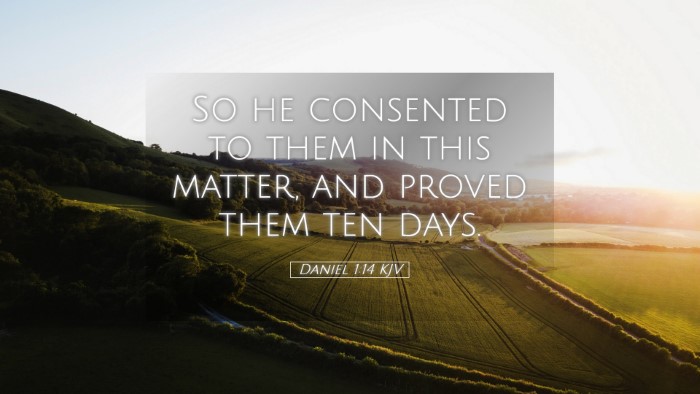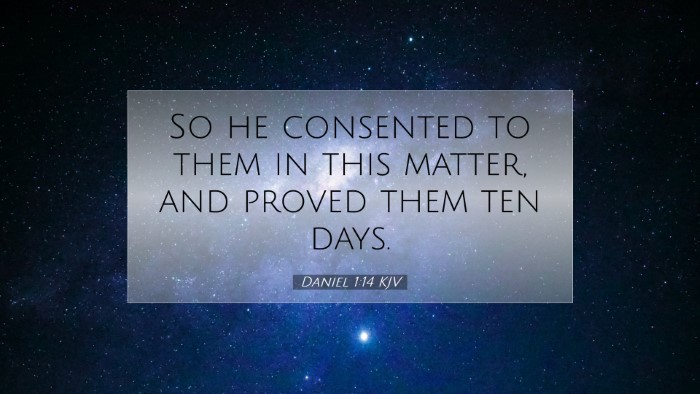Old Testament
Genesis Exodus Leviticus Numbers Deuteronomy Joshua Judges Ruth 1 Samuel 2 Samuel 1 Kings 2 Kings 1 Chronicles 2 Chronicles Ezra Nehemiah Esther Job Psalms Proverbs Ecclesiastes Song of Solomon Isaiah Jeremiah Lamentations Ezekiel Daniel Hosea Joel Amos Obadiah Jonah Micah Nahum Habakkuk Zephaniah Haggai Zechariah MalachiDaniel 1:14
Daniel 1:14 KJV
So he consented to them in this matter, and proved them ten days.
Daniel 1:14 Bible Commentary
Commentary on Daniel 1:14
Daniel 1:14 states:
"So he consented to them in this matter, and proved them ten days."
Introduction
This verse marks a pivotal moment in the narrative of Daniel, showcasing his resolve to adhere to his convictions amid a foreign culture. The context of the verse is critical as it provides insights into the broader themes of faithfulness, resilience, and divine providence. The consultation between Daniel and the prince of the eunuchs reveals profound lessons for believers across generations.
Contextual Background
The events of Daniel 1 occur during the Babylonian exile when many young Israelites were taken captive and brought to serve in the king's palace. This context presents a challenge to their identity and faith. Daniel, along with his companions, is confronted with the opportunity—and pressure—to assimilate into Babylonian culture, particularly through a royal diet that contradicted their Jewish laws.
Insights from Public Domain Commentaries
-
Matthew Henry:
Henry emphasizes the significance of Daniel’s decision. The verse reflects how Daniel "proved" or tested the dietary plan for ten days as a demonstration of faith. Henry notes that this act of faith is foundational, showcasing how God honors the resolve of those who seek to preserve their convictions. He indicates that the number ten may symbolize completeness in this testing phase.
-
Albert Barnes:
Barnes highlights that the consent given by the chief official is more than mere compliance; it illustrates the diplomatic skill and respect Daniel commands even in a hostile environment. He argues that Daniel takes a calculated risk, showing great wisdom in how he navigates this situation. Barnes also reflects on the dietary restrictions, suggesting that it was crucial for Daniel not to partake in food that could defile him spiritually.
-
Adam Clarke:
Clarke provides a detailed analysis of the implications of the eunuch's consent. He asserts that Daniel’s request was not simply about food but about maintaining his distinctiveness as a follower of Yahweh. Clarke references the spiritual insight that can be gained from the dietary choices, emphasizing that what we consume—physically and spiritually—impacts our walk with God. He also notes that this moment marks the beginning of Daniel's testing of faithfulness to God amidst adversity.
Theological Reflections
This verse and its surrounding context offer rich theological insights:
-
Faith and Conviction:
The steadfastness of Daniel invites believers to reflect on their own convictions. How do we navigate our faith in settings that challenge our beliefs? Daniel’s example teaches us the importance of knowing when to stand firm and take risks for the sake of our faith.
-
God's Providence:
Daniel 1:14 illustrates divine providence at work. Daniel's request is granted, showcasing that God can influence the hearts of leaders in our favor. This encourages believers to trust that God is in control, even when situations seem dire.
-
The Importance of Community:
The companionship among Daniel and his friends highlights the value of support in standing firm in faith. Christian fellowship can strengthen our resolve and commitment to God amidst external pressures.
-
Cultural Engagement:
Daniel’s actions urge reflection on how believers engage with secular culture. There is a delicate balance between adapting and compromising. This verse encourages discussions about how to remain true to our faith while interacting with the world around us.
Practical Applications
The lessons drawn from Daniel 1:14 can translate into practical applications for modern believers:
-
Be Informed and Prayerful:
Before making decisions that affect spiritual integrity, seek wisdom through prayer and the Word. Daniel’s resolve was rooted in knowledge and understanding of his laws.
-
Prioritize Spiritual Integrity:
As believers, we must ensure that our choices reflect our commitment to God, standing firm against cultural pressures that seek to dilute our faith.
-
Seek Common Ground:
When facing opposition, like Daniel, employ negotiations grounded in respect and understanding, looking for mutual benefits rather than outright confrontations.
-
Foster Community:
Encourage bonds of fellowship that support and strengthen faith commitments. Like Daniel, engage with those who share your convictions, as they can provide spiritual encouragement in challenging times.
Conclusion
Daniel 1:14 is a succinct yet profound testimony of faithfulness in the face of adversity. The insights gathered from historic commentaries provide a multifaceted understanding of the verse, inviting believers to reflect on their stance amidst cultural challenges. As we study Daniel’s resolve, may we be inspired to uphold our convictions with the same steadfast spirit, trusting in God’s providential guidance throughout our journeys of faith.


